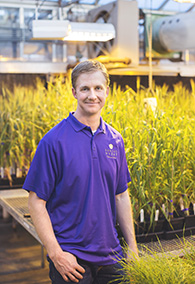Kansas State University researcher receives national award for early career plant breeding work
Wednesday, July 13, 2016
MANHATTAN — A Kansas State University researcher has received the National Association of Plant Breeders' 2016 Early Career Scientist Award.
Jesse Poland, assistant professor of plant pathology, is the winner of the annual award, which recognizes a young scientist who is active in the field of plant breeding.
"This is a very nice recognition, and even better that two of my students made the nomination, which was the biggest honor," Poland said. "I think there is a real need for well-trained students going into plant breeding around the world to work on developing new high-yielding varieties and meet the challenge of food security in the coming decades."
Award nominees must exhibit the ability to establish strong research foundations, such as experimental techniques and publications; interact with multidisciplinary teams; and participate in professional societies relevant to their discipline.
Poland has contributed to the study of plant breeding through publications, teaching and communicating his research at meetings, conferences, workshops and field days. Among Poland's accomplishments in less than six years as a research geneticist at Kansas State University:
• Advising 10 doctoral students and seven postdoctoral students and serving as a committee member for several other students in plant breeding and genetics.
• Welcoming and training visiting students and scientists from India, Italy, Mexico and Uruguay.
• Serving as the adviser to the university's Plant Breeding and Genetics Club since its founding.
• Securing more than $12 million in competitive grants.
• Authoring more than 50 publications with 4,000 total citations.
Two of Poland's most significant achievements are the development and refinement of genotyping-by-sequencing, a novel method for genetic characterization of wheat and other species, and the development of portable high throughput phenotyping platforms. Genotyping-by-sequencing has become an innate component of breeding programs around the world that allows low-cost whole-genome marker profiling. High throughput phenotyping platforms are helping breeders and researchers to maximize the amount of data available to them to make more accurate selections.
Poland also contributed to the development of the first physical sequence of barley, as well as the draft sequence of hexaploid wheat under international sequencing consortiums.
Poland's nomination package, submitted by Trevor Rife, Torrington, Wyoming, and Narinder Singh, Ludhiana, India, both doctoral students in genetics, chronicles his career progress and significant achievements. Since joining Poland's research team as his first doctoral student in 2011, Rife has seen Poland assemble a research team of students and scientists from a variety of academic backgrounds.
"Jesse's desire to teach, share knowledge and stimulate our critical thinking are the best characteristics an adviser can have, and he also encompasses all the qualities that comprise an exceptional scientist," Rife said. "He is working to not only further our understanding of the natural world but also to ensure that knowledge is rapidly translated to farmers so that it positively influences their lives."
Poland is from Chapman, where he and his parents grow wheat, corn, soybean and alfalfa.

